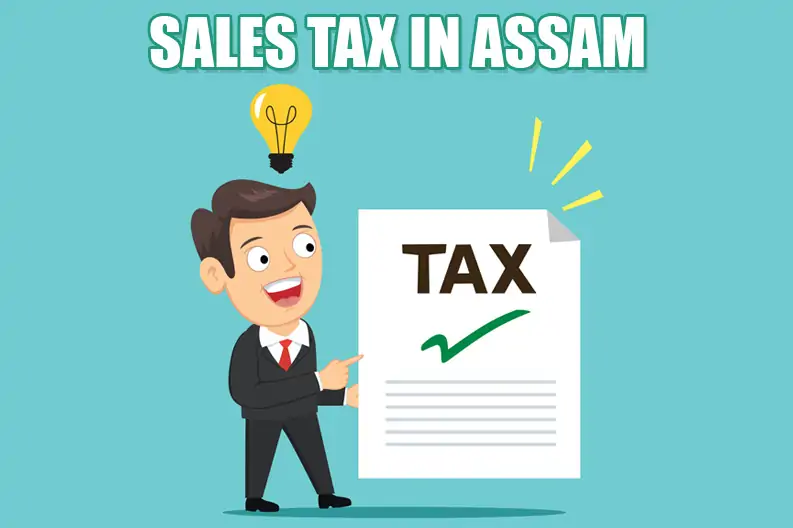Sales tax is an indirect tax paid to the state government on the sale of some goods and services. Every state has a different law pertaining to sales tax. A sales tax is usually an additional amount one has to pay when purchasing any goods and services. Unless any dispute arises, sales tax has to be paid in the state where the transaction takes place. Thus, sales tax is a major source of revenue for the state. Let us get to know about sales tax in Assam.

Different types of Sales tax
Sales tax can be of different types. Some of them are:
- Value added Tax: It is a type of additional tax levied on all sales.
- Wholesale tax: It is applicable on sellers who are engaged in wholesale distribution of goods and sale of manufactured goods.
- Retail tax: It is paid by final consumer during a sale of goods.
- Manufacturers’ tax: It is levied on the manufacture of goods.
The calculation of sales tax involves simply multiplying and obtaining a product of the sales price of a product with the applicable rate of sales tax.
Forms applicable for Sales Tax
Here is a list of the various forms which have to be furnished by a seller if he is eligible to pay sales tax in Assam:
Form A – Form for central sales tax
Form B – Certificate of registration for central sales tax
Form G – Form of indemnity bond for sales tax
Form III – Form for return of turnover for sales tax
Form V – Form of appeal for sales tax
Form V A – Form of appeal for sales tax
Form V I I – The central sales tax form
From X – Form for security bond of sales tax
Form X I – Despatch note form for sales tax
What are the rates of tax applicable under sales tax?
| SR No. | LOCAL RATE OF TAX | RATE OF TAX | |
| SALE OF REGISTERED DEALER | SALE TO OTHER THAN REGISTERED DEALER | ||
| 1 | IF THE GOODS ARE GENERALLY EXEMPT UNDER THE LOCAL ACT | EXEMPT | EXEMPT |
| 2 | LESS THAN 4% | LOCAL RATE OF TAX(C/D FORM NOT REQUIRED) | 10% |
| 3 | DECLARED GOODS | LOCAL RATE OF TAX AGAINST C/D FORM | TWICE THE LOCAL RATE OF TAX |
| 4 | 4% OR MORE, UPTO 10% OTHER THAN DECLARED GOODS | 4% AGAINST C/D FORM | 10%
|
| 5 | MORE THAN 10% OTHER THAN DECLARED GOODS | 4% AGAINST C/D FORM | LOCAL RATE OF TAX |
FROM 01-04-2007 TO 31-05-2008
| SR NO. | LOCAL RATE OF TAX | RATE OF TAX | |
| SALE OF REGISTERED DEALER | SALE TO OTHER THAN REGISTERED DEALER | ||
| 1 | IF THE GOODS ARE GENERALLY EXEMPT UNDER LOCAL ACT | NIL | NIL |
| 2 | 1% | 1% (C FORM NOT REQUIRED) | 1% |
| 3 | 2% | 2% (C FORM NOT REQUIRED) | 2% |
| 4 | 3% | 3% (C FORM NOT REQUIRED) | 3% |
| 5 | MORE THAN 3% | 3% (AGAINST C FORM) | LOCAL RATE |
FROM 01-06-2008
| SR NO. | LOCAL RATE OF TAX | RATE OF TAX | |
| SALE TO REGISTERED DEALER | SALE TO OTHER THAN REGISTERED DEALER | ||
| 1 | IF THE GOODS ARE GENERALLY EXEMPT UNDER LOCAL ACT | NIL | NIL |
| 2 | 1% | 1% (C FORM NOT REQUIRED) | 1% |
| 3 | 2% | 2% (C FORM NOT REQUIRED) | 2% |
| 4 | MORE THAN 2% | 2% AGAINST C FORM | LOCAL RATE |
Frequently asked questions
- At what basis is sales tax charged?
Sales tax is charged by the state government of Assam on the cost price of a product, which is multiplied by the rate of sales tax applicable at that time, to arrive at the figure of sales tax amount due.
- What is the purpose of providing sales tax at the state level?
Given the large scale activities of trade carried out in India, a more local control was thought best for administering sales tax. Hence, sales tax is charged locally by each state, which also helps in improving their revenues and provides greater control over the administration of sales tax in the country as a whole.
- Are there any exemptions in sales tax in Assam?
Almost every state in India provides relief to certain category of taxpayers so that the incidence of double taxation can be avoided. Hence, in cases where products are sold to charitable institutions, the sales tax is exempted, ultimately bringing down the price of the products. Similarly, goods sold to a school are exempt from the provisions of sales tax. There are certain essential commodities as well which are not included within the purview of sales tax.